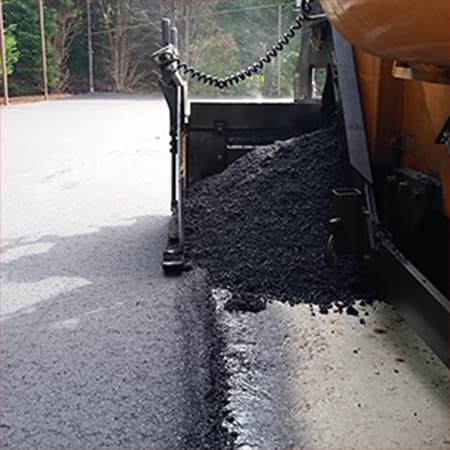Asphalt Milling: What It Is & How It’s Done
If your asphalt surface is starting to crack, develop potholes or show its age, you might be wondering how to fix it. One potential solution is asphalt milling, which is a great way to efficiently create ideal surfaces. Milling can be both a solution in itself and a fundamental part of a full repaving job. Take a closer look at the asphalt milling process and its benefits.
What is Asphalt Milling?
Asphalt milling is the process of scraping away part of your pavement to create an even surface and uniform texture. Specialized machines remove the top layer of asphalt, or all of it for that matter, and collect the debris, commonly called asphalt millings. It’s similar to mowing your lawn.
Many paving projects include asphalt milling because it can help prepare the site before replacement with new asphalt. However, milling is also an alternative to full replacement in certain cases. The amount of asphalt a milling machine can remove can vary, meaning you don’t have to pull up all your asphalt or sub-base if you only want to balance your surfaces and remove irregularities. After you finish the asphalt milling process, you’ll have a more pristine surface that’s ready for reuse or repaving.
The Asphalt Milling Process
As a standalone project or as part of a larger paving project, asphalt milling is relatively straightforward. The process involves several steps.
- Site assessment: A professional will work with you to determine whether your paving will benefit from asphalt milling. If no sub-base work is needed, then this may be the right solution.
- Scraping: Specialized milling machines will remove the top layer of asphalt down to an appropriate depth. The depth can vary depending on the extent of the damage or your plans for your project.
- Debris collection: The scraped asphalt will be collected for disposal or recycling. Scraped asphalt can often be repurposed and freshly re-poured.
- Cleanup: The site is then washed clean of debris and residual scrapings.
At this point, the even-milled surface is ready for reuse or repaving.
Benefits of Asphalt Milling
Asphalt milling can offer several benefits compared to traditional full-depth paving, including:
- Cost savings: If you don’t have to remove all existing asphalt or paving structures in order to resurface your space, your investment in reliable repairs may be much lower. If you choose to use recycled millings as part of your repaving process, these may also be much cheaper than new concrete or asphalt.
- Eco-friendly solutions: The asphalt millings collected by the milling machine can often be recycled and repurposed into other paving or construction projects, reducing waste. Recycled products also usually require less prep and processing than new concrete, reducing the need for gas-powered machinery or non-eco-friendly rock acquisition that can endanger habitats and increase carbon emissions.
- Durability: Asphalt milling will protect existing, undamaged pavement and won’t disturb your sub-base. Provided the substructure is in good condition, you’ll have a strong surface onto which you can pour new paving. If you decide to use repurposed millings as your new pavement, you’ll also receive a well-processed and strongly binding system that will withstand years of further use.
- Improved surfaces: By milling, you create a more stable surface on which to begin any repaving. Doing so minimizes the risk of irregularities on the new pavement. Milling’s effective grade control also removes a consistent depth of existing pavement, creating cohesiveness.
Moreover, repaving using recycled asphalt millings instead of new concrete can speed up your project timeline. Certain recycled milling takes less time to reharden, offering convenience and minimal traffic disruptions from the parking lot to the main thoroughfare.
How Does Asphalt Milling Compare to Other Paving Methods?
Compared to other paving methods like asphalt resurfacing and full-depth reclamation, asphalt milling is less involved, more convenient and more sustainable. These traditional repaving methods often involve more work and much more disruption to the existing surface and sub-base, which in some cases may not be fully necessary. If your site can benefit from asphalt milling alone without risking your existing paving’s integrity, asphalt milling may be your best option.
Raleigh Paving’s Milling Services
Asphalt milling is an efficient, convenient and cost-effective way to create a flat, even surface that’s ready for repaving or reuse. You won’t have to worry about disturbing your sub-base or existing good paving to make asphalt repairs, and you’ll be investing in a more eco-friendly alternative to other paving methods.
If you want to explore the potential for milling in more detail, reach out to Raleigh Paving. We’re the Triangle’s trusted commercial paving company that’s celebrating our 100th year of quality service. Request a free quote or call (919) 859-3626 today.
Find Your Paving Solution





